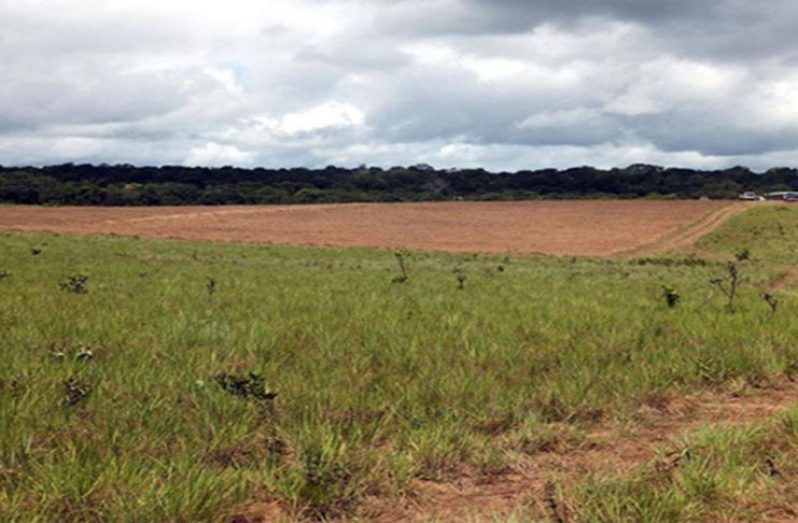–$6.3B towards ailing GuySuCo
SOME $19.4 billion has been allocated to the agriculture sector in 2018 and Government has begun exploring the possibility of harnessing the vast agricultural potential of the Intermediate and Rupununi Savannahs.
Delivering his fourth budget on Monday, Finance Minister, Winston Jordan told the House that more must be done to improve the competitiveness of farmers, through diversification and agro-processing.
In 2018, he said, Government will facilitate the development of the Savannahs; work with the private sector to stimulate growth in agro-processing; expand our investment in non-traditional crops, livestock, extension services, and further research; and consolidate our drainage and irrigation services.
“Mr. Speaker, our intensified focus on diversification and value-added production in the non-sugar agriculture sector becomes absolutely critical at this point, as the sugar industry continues to undergo restructuring. This is key to ensuring that the sector remains productive and growth-stimulating,” he said.
In 2018, the Special Purposes Unit (SPU) is tasked with examining and articulating the way forward with respect to the divestment of the Skeldon, Rosehall, and East Demerara estates.
With respect to the remaining estates, the SPU will also work to reconfigure operations to guarantee economic viability.
“Our taxpayers must no longer be burdened to carry the weight of an un-profitable, inefficient, and antiquated public corporation. Government has allocated $6.3 billion, in 2018, to support the reduced operations of GuySuCo. The Government intends to uphold its duty to the communities and families in the areas affected by divestment, as part of the GuySuCo restructuring. In order to ensure continued livelihoods, a skills re-training programme is anticipated to be offered for those who choose to pursue new opportunities.
Those who wish to continue with a livelihood in agriculture may see an opportunity to own their own farmland. In addition, the Government will assume responsibility for social services, including health centres and community centre grounds. We will also undertake critical drainage and irrigation services for the areas affected by divestment,” the minister said.
He also said that the Government is committed to improving the livelihood of rice farmers and recognises that one important aspect of strengthening stability and sustainability of Guyana‘s rice sector is to increase productivity per unit area.
UPDATING EXPERTISE, TECHNOLOGY
As such, Jordon said the Government will partner with the Islamic Development Bank (IDB), through the Malaysia Agricultural Research and Development Institute (MARDI), in updating the expertise and technology in rice production, through a Reverse Linkage Project to the tune of US$863,000.
This will be done through the introduction of innovative rice varieties from MARDI that are more resilient and will significantly increase rice yields per unit.
In 2018, an allocation of $265 million has been made to design and commence construction of an agricultural centre and reservoir in Lethem, and commence upgrading of the agricultural research station in Ebini.
These stations will facilitate research programmes in cassava, peanuts, orchards, livestock, and pasture development in the Savannahs; and complement the existing demonstration farms for turmeric, black pepper and ginger in Hosororo and Mabaruma, all geared towards the expansion of non-traditional crop production.
In addition, discussions have begun with a view to conducting a feasibility study for the most suitable options to opening up of the Linden-Ituni-Kwakwani and Kwakwani-Ebini corridors.
The development of agriculture in these areas, Minister Jordan said would result in a more resilient industry that will no longer be affected by the coastal threats caused by climate change.
“However, while we tackle the issue of geography, we must ensure that competitiveness is not compromised. Government remains proactive in the promotion of non-traditional agricultural products, new technologies and supporting infrastructure towards the ultimate goal of enhancing national production and productivity.
These efforts will not only maintain national food security, in an efficient and sustainable manner, but, also substantially transform the cost structure and competitiveness of our agriculture sector,” Jordan said.
The National Agriculture Research and Extension Institute (NAREI) will continue to support the expansion of the agricultural base and reduce dependence on imports, through research in improving the yield of non-traditional crops, as well as testing the feasibility of agro-processing in various areas.
To complement these efforts, draft regulations for general food safety which will cover fruits and vegetables; water; slaughterhouse regulations; beef inspections and grading; and poultry, milk, and eggs will be completed, in 2018, in a conscious effort to standardise the outputs of the sector, thereby improving competitiveness and promoting easier access to international markets, the finance minister said.



.jpg)








